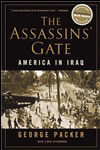The Assassins’ Gate
by George Packer
A brilliant historical study of America's adventure in Iraq.
If Chandrasekaran is the definitive picture of the Occupation’s antic spirit and Ricks' Fiasco the comprehensive tale of its unravelling, Packer is its chronicle of ideas, its intellectual history. Even those who follow the news — perhaps especially those who follow the news — may be astonished by the notion that the Bush administration could possibly possess an intellectual history. Yet ideas there were, bright and beautiful ideas, and for a time they seemed sensible and just and — possibly — achievable. Packer himself found aspects of the neoconservative argument attractive. Could Iraq have been rescued from tyranny and turned into a liberal, secular democracy? Could peace and justice have prevailed?
Packer examines the best pre-war writing and thinking about Iraq, draws out the key ideas, and shows how they influenced they key actors among the administration, the CPA, and the Exiles. He reaches easily for pioneering voices, T.E. Lawrence and Gertrude Bell, as well as Kanan Makiya and Paul Wolfowitz, and shows that the central urge behind the invasion was the desire to get it right this time — not merely responding to the first, incomplete Gulf War but also in to the Vietnam War’s apparent failure to "finish the job" and also to World War II’s haunting reminder that a delayed liberation will come too late for the victims.
In the end, Packer blames both the incompetence of the administration, the Occupation’s absurd mixture of wastefulness and cheeseparing, and the intractability (and feebleness) of the idea of Iraq itself for the grotesque and tragic failure of the American adventure.
The intellectual history of the Bush war will soon seem an oxymoron. Read this book now, and absorb its lessons while the players remain on the stage; soon, the buffoonery of the Bush crew will be so dominant in imagination that the lessons of Iraq will be hard to recover.
